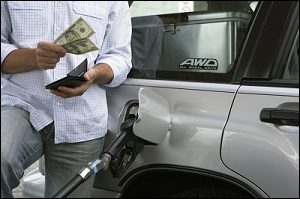President Trump’s call for Congress to pass major infrastructure legislation left some lawmakers praising his focus on rebuilding transportation and other critical systems. It also left some lawmakers ready to battle and many wondering how to pay for it.
The initial reactions indicated that Congress will need to sort through many issues and often conflicting views to put together a big project investment bill this year.
Sen. John Barrasso, R-Wyo., who as chairman of the Environment and Public Works Committee will have a key role in shaping the Senate’s legislation, said in a statement he was “pleased to hear the president discuss the need to upgrade the country’s aging infrastructure. America’s roads, bridges, dams, highways, and ports are crucial to the nation’s success. We need a robust, fiscally responsible infrastructure bill that makes it easier to start and finish projects more quickly.”
But in the House, Rep. Peter DeFazio, D-Ore., ranking minority member on the Transportation and Infrastructure Committee, said he was disappointed by Trump’s infrastructure remarks in that the president provided “only generic talking points without any specific details about how he plans to address our infrastructure crisis.”
DeFazio said: “If the administration wants bipartisan support they must offer an infrastructure plan that strengthens the federal commitment to our national transportation network by providing sustainable, long-term funding, and filling the crater in the Highway Trust Fund.”
“President Trump cannot pretend to solve our infrastructure woes by slashing real investments to states and local governments, pushing the responsibility off federal balance sheets, cutting existing transportation programs to pay for Wall Street and foreign investors to toll our roads, and gutting bedrock environmental protections. Regrettably, the administration’s plan will likely do just that.”
Meanwhile, Politico reported that House T&I Chairman Bill Shuster, R-Pa., said he was waiting to see the president’s full proposal to figure out what can pass the House and how lawmakers will need to change it.
It reported that some Republicans in both the House and Senate were open to discussing a hike in motor fuel taxes to cover the cost of an investment program, while others were talking about possibly increasing domestic spending caps to allow the extra funds to flow to project spending.
Reports said those open to discussing a fuel tax increase included both Shuster and Sen. Charles Grassley, R-Iowa. Politico said Grassley told reporters Jan. 31 that while he “won’t be out there pushing for” raising the gas tax, “everything has to be on the table” to pay for the infrastructure plan.
Politico also reported that Sen. John Kennedy, R-La., revived the possibility of tapping revenue on earnings that corporations are repatriating to the United States from abroad now that the new tax law has cut the repatriation rate they will pay.
But Politico highlighted an area of disagreement between the political parties, in that GOP members were more likely to support a bill focused on aiding specific projects while Democrats generally supported routing funds through existing programs to boost infrastructure.
The Washington Post said many Republicans support routing investments through public-private partnerships that draw financing from for-profit companies, often repaid through tolls, while Democrats favor improving infrastructure through direct federal funding.
The Post quoted Sen. Claire McCaskill, D-Mo., saying that “there are a bunch of us that want to work on infrastructure, but it can’t be overly reliant on tolls from blue areas of the country and leave red areas of the country behind.”


